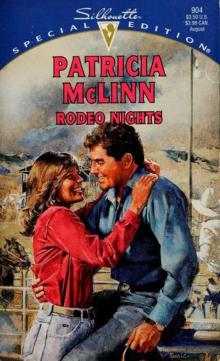- Home
- Patricia McLinn
Heart Stealers Page 2
Heart Stealers Read online
Page 2
“Then shorten the time. Every day for ten weeks is too much.”
Seth just stared at her.
“All right,” Cassie said with exasperation. “He doesn’t really start today, though, does he? I’ve got to prepare the kids.”
“Yes, he does. We knew something like this was in the works, but I just got word Friday afternoon exactly what kind of program it would be and when it would start. And I didn’t want to ruin your weekend.” He glanced at his watch. “But I’ll stall him here for half of your class. We’ll discuss the program, and I’ll get to know him a little. You can use the first part of that two-hour-block schedule you talked me into to prepare the kids.”
“All right.”
“I’m counting on you, Cass.”
For a minute, Cassie was transported back nineteen years. Seth had stood at her desk after one of his English classes and said those exact words to her. He’d known she was going to take off for good that night, to escape the seediness of the one-room apartment where she lived, the derogatory names people called her and her mother, the consistent failure in school.
She’d been sixteen.
And the man before her had encouraged her to stay, to keep a journal about her life, and he’d insisted she talk to him about everything. Finally he’d arranged legal and professional help for her. Cassie shuddered when she thought about where she’d be if it wasn’t for him.
Glancing down her leg, she caught sight of the small rose tattoo at her ankle. She’d had it done in a grungy tattoo parlor in Greenwich Village when she was fifteen; she kept it as a reminder of what it was like to be one of the kids she now taught.
“Cassie?” Seth’s question brought her back to the present.
“Yeah, I know you’re counting on me. Just like I know that you know exactly what you’re doing when you say that to me, Mr. T.” She used the old name intentionally, and it brought a smile to his face.
“Now go,” he said gruffly. “Unless you want to bump into Lansing.”
Cassie stood and hurried out of the office. She didn’t want to bump into Lansing now, or ever. But damn, she’d do anything for these kids, even it meant letting a cop—correction, a police officer— into her classroom.
* * *
Mitch Lansing was not a happy man. As he strode down the hallway with the principal of Bayview Heights High School, he cursed the fates that had brought him to this point in his life. How the hell had he ended up here?
When they reached the east wing of the school, the first thing he noticed was the low hum of student voices. There was occasional laughter punctuated by adult comments.
“Here we are.” Taylor knocked on the open door of 401.
Mitch looked around for Ms. Cassie Smith. Had she left the kids alone? They were all in a group in the far left-hand corner of the room. But they weren’t at desks. Some were on couches, some sat on the floor, one perched on top of a table. The area was plushly carpeted and brightly lit by the sun slanting in from uncovered windows behind them. He scanned the walls, taking in some of the posters: “School might be hard, but it’s better than growing up…The thing we call failure is not falling down but staying down…It’s what you learn after you know it all that counts.” He smiled at the sentiments.
Someone unfolded from a zebra-print stuffed chair and came toward them. Mitch’s smile disappeared when he realized who it was. She looked even younger today, probably because of the way she was dressed. Her clothes were casual—checked shorts that looked like a skirt and a long-sleeved wine-colored sweater. He tugged at his tie.
When she reached them, she held out her hand and smiled. Plastic. He knew it matched the one on his face.
“Hello, Captain Lansing.”
“Ms. Smith.”
Taylor stepped farther into the room. Mitch noticed that the kids had continued with whatever they’d been doing when he and the principal had come to the door.
“Silent sharing time?” Taylor asked.
She nodded.
“Can I go over?”
“You can go, but they probably won’t let you see their writing today.” She looked at Mitch. “No offense, Captain, but they aren’t too happy about having a stranger invade their turf. However, they’ve agreed to be civil, and it will work out, I’m sure.”
She didn’t sound sure, Mitch thought. Well, hell, neither was he.
As Taylor crossed to the far corner, the kids glanced up at him. Most greeted him congenially. He spoke to the girl sitting on the desk, and she smiled. He ruffled the hair of two boys who sat on the floor. A kid on the couch tipped his baseball cap to him.
“They’re allowed to wear hats in class?” Mitch asked.
Ms. Smith closed her eyes briefly. When she opened them, they reminded him of an overcast sky in January. “This isn’t a church, Captain.”
“No, but kids should show respect for their school.”
“And taking off your hat shows respect? Not in here. Read the poster over my desk. We have our own definition of respect.”
Mitch scanned the room. “Where’s your desk?”
She pointed to an area to the left. A big gray metal desk sat unobtrusively in the corner. It was covered with folders and papers. Next to it was a tall bookshelf that housed books, picture frames, more folders. Sure enough, on the wall behind her desk was a big poster—beautifully scripted by someone with artistic talent. The word respect was printed vertically, and each letter spun off horizontally into a statement. “R—Rules are for a reason, obey them; E—Expect and return common courtesies; S—Show others you care; P—Put a lid on negative comments, even if you have them; E—Exhibit pride in yourself and let others have theirs; C—Consider the effect your words and actions have on others; T—Take what you need but give what others have to have, too.
After he’d read it, Mitch turned back to the hostile Ms. Smith. Her face was smug. He was about to comment on the definition, when Taylor returned. “Where’s Johnny?”
Ms. Smith threw Mitch a scathing glance. When she looked at Taylor, though, her face showed very real concern and a surprising vulnerability. “No one knows. When we called home, his mother said she hadn’t seen him in three days.”
“Since Friday?”
“Yes.”
“Did you have any contact with him over the weekend?”
“No.” She bit her lip and something inside of Mitch shifted. “I’m worried.”
Taylor reached out and squeezed her shoulder. Not a smart move in these days of sexual harassment cases, Mitch thought.
“I’ll see what I can find out,” the principal told her.
“Thanks.”
As he walked to the door, Taylor said, “Good luck, Mitch. Stop and see me when you’re finished here.”
Mitch nodded, and Taylor left. Casually, Mitch stuck his hands in the pockets of his suit pants pockets and looked at Cassie. “I’m sorry the boy is missing,” he said simply.
“Are you?”
“Yes.” When she said nothing more, he asked, “Well, how do we start?”
Silently, she folded her arms over her chest and leveled wary eyes on him. “With the kids, of course. After all, that’s why you’re here. Come on, I’ll introduce you.” She looked him up and down. “I realize you’ve come to help educate these students, Captain, but you can’t be in class without participating in the activities. Participation is required from everyone.”
He hadn’t planned on that. The idea was mildly alarming. He thought he’d just be an observer on the days he didn’t have to present material. “That was never discussed.”
“Well, it’s a rule in this classroom, Captain. Everyone participates, including the adults. You like rules, don’t you?”
She was toying with him, and that he didn’t like.
“I’ll see what I can do,” he said sarcastically.
Accompanying her across the room, he could feel his heartbeat accelerate as he approached the teenagers. Damn, this was hard.
“Okay, ever
yone,” Ms. Smith said. “This is Captain Lansing from the Bayview Heights Police Department.” Indicating the chair she’d vacated, Cassie said, “Sit here, Captain.”
He sat. As he did, he saw two boys watch his every move with suspicious eyes. Three kids totally ignored him. One girl whispered to another next to her, and they both giggled.
The teacher addressed him. “I’ve told everyone about your stint with us. They have a lot of questions, but I thought we should start by getting acquainted.” She glanced at the clock. “We have an hour left. Let’s play the name game.” When most of them groaned—good naturedly but expressing their reluctance, nonetheless—she made eye contact with each student and got their assent. Then she met his gaze. Hers was direct, no nonsense, confident.
Mitch felt as if he had no choice but to nod, too. “Could you fill me in on the rules first?”
“Each person tells his or her name and shares one significant personal thing with the group. It helps us get to know one another and also will help you learn their names.”
At least he would be all right there. He had a photographic memory. Unfortunately. There were a lot of things he’d give his soul to forget. As he looked around, he squelched the inner warning that working with these teenagers was going to bring back those images. That was why he’d stayed away from adolescents for twenty-five years. That was why he didn’t want to be here now.
“Who would like to start?” Cassie asked, interrupting his reflection. When no one volunteered, she dropped to the floor, clasped her hands in her lap and looked at them. A long, uncomfortable thirty seconds passed before a young girl raised her eyes to the ceiling and said, “Oh, all right. I’ll start.” Cassie gave her a million-dollar smile, which the girl returned. “I’m Jen Diaz.”
“And? One significant thing about yourself?”
Again, the rolled eyes, the stock-in-trade teenage show of disgust. “I, um, just got a new stepfather.”
They went around the room—slowly, some begrudgingly.
“Austyn Jones,” a young black student said. He pulled at the lapels of his sport coat. “And I’m into rags.”
“Clothes,” Cassie said to Mitch.
“I know,” Mitch responded dryly.
“Nikki Parelli,” a sweet-looking redhead volunteered. “And I like to write.”
“Nikki won first place in the literary magazine’s poetry contest last year,” her teacher said proudly.
“Brenda Uter,” a dark-eyed girl said when it was her turn. “And I’m popular.” Everybody laughed, but no one made a smart remark as Mitch expected.
They proceeded like that—Som Choumpa, a young girl from Vietnam who loved clothes and had the same eyes as those that haunted Mitch’s dreams; Amy Anderson, who had a two-year-old child; Joe DeFazio, who took mechanics in a special afternoon program; the sports star Don Peterson; Tara Romig, a dancer; Amit Arga, whom he’d met in court. Two kids were absent, Mike Youngblood and Johnny Battaglia, bringing the total to twelve—an even dirty dozen.
“Your turn, Ms. S.,” Jones said. “And don’t give him nothing stupid. Like you’re a teacher.”
She smiled. “Okay, okay. Let’s see. My name is Cassie Smith,” she began, but Jen Diaz interrupted, “Cassandra...named after the Greek woman who could foretell the future.”
Cassie chuckled. “And I like to play softball.”
“Yeah, she teaches our spring Phys. Ed. unit,” Arga told him.
“Are you certified to do that?” Mitch asked.
She gave him a disgusted look. “The law says you can teach one course out of your certification. Now, how about you, Captain?”
He squared his shoulders and struggled not to wipe his sweaty palms on his pants. How long since he’d been forced into such uncomfortable disclosure? “I’m Captain Lansing.”
“Captain your first name?” the young Italian boy—DeFazio—asked.
Unnerved, Mitch shot back, “No. It’s Mitchell. Mitch Lansing,” he corrected himself, feeling foolish. “And I…Suddenly he was at a loss. What did he tell these kids? Who was he, really? His family came to mind—what was left of it after his parents had died within six months of each other. “I have a brother Kurt. He’s important to me.”
Revealing anything about himself was tough, but the soft approval in Cassie Smith’s eyes made him even more uneasy. He didn’t expect her good favor, didn’t want it.
“Can we ask him some questions now?” Nikki directed the question to her teacher.
Cassie looked to Mitch. “It’s up to him.”
He scanned the kids. How hard could this be? “Sure.”
“You can pass on some if you want,” the young girl told him helpfully.
He gave her a small smile. He was going to like Nikki Parelli. “Fair enough.”
“You the one who arrested Johnny?” Arga asked.
“I didn’t arrest him. I had him brought in for questioning.”
“He lost his job.”
“I was sorry to hear that.”
“Why you here?” the boy continued.
“Because the Bayview Heights Police Department decided it would be good business for the law enforcement agencies to work with the schools. Remember the DARE program when you were younger?” Mitch asked, referring to the statewide anti-drug program the police conducted in the lower grades. Arga nodded. “This is an extension of that. They believe it will help crime prevention and establish better relations between the school and the police department.”
“They?” This was from Peterson, the sports star.
Mitch ducked his head. These kids were quick. “I just came to Bayview Heights six months ago. I guess I’m not fully acclimated.”
“What’s that mean, Ms. S?” Peterson asked.
“He’s not used to being in Bayview Heights yet.”
“Will you be teachin’ us anything?” DeFazio asked.
“Yes. There’s a curriculum of ten lessons, one a week, that I’ll be delivering.”
“On what?” several asked at once.
“Drugs, weapons, juvenile crime, vandalism, addiction, violence prevention, theft.”
Their teacher added, “It’s a lot like the other people who came into your science, math and social studies classes. We’re trying to integrate the community into this program and use their expertise to help you.”
“Yeah, I liked that social worker broad,” Peterson said. “She was great lookin’.”
“I liked her because she helped me out, you know, at home,” Som Choumpa said.
“And the business guy, he got me the job at the garage.” This from DeFazio.
“See,” Cassie told them. “Some good things came out of those programs. Captain Lansing has a lot to offer, I’m sure.”
The lady doth protest too much, Mitch thought. He seemed to be the only one to catch the note of uncertainty in her voice.
“Where were you before, if you just came to Bay-view Heights?” popular Brenda asked.
“I worked in New York City. On their police force.”
A few of the kids whistled. “Yeah? You ever kill anybody?” Jones asked.
Not as a cop. “I pass.”
Out of the corner of his eye, he saw Cassie studying him critically.
“What did you do in the city?”
“I worked in vice. Then, for several years, in the narcotics unit.”
“Hey, DeFazio, you better watch out.”
He saw Cassie stiffen and quell the kids with just one look. Amused in spite of himself, Mitch thought he’d shut up, too, if she looked at him like that.
“How old are you?” Amy asked.
“Forty-six.”
“That’s old. Even Mr. T ain’t that old,” Arga teased. “Why you still a cop?”
What else would I do? “I like it. But I wanted a change, so I left my job in the city and decided to come out here.”
“Why?”
“Because it’s a slower pace.” He smiled. “Because I’m old.”
They l
aughed. “Why here?” Jen asked.
“Because your chief of police is a long-time friend of mine.” Who tricked me into working with you kids.
And he had to be tricked into this. Interacting with these teenagers had already caused a little bit of the wall around his heart to crack. He didn’t want to care. He couldn’t afford to care.
He’d cared once and it had ripped him apart.
* * *
Cassie watched Mitch straighten his paisley tie, pull up the legs of his trousers and sit down on a straight chair. He was armored with his suit, tie and wing tips again today. She was only partly amused by his stuffed-shirt demeanor. Mostly, it raised her old fears.
They’d had an inauspicious beginning with Johnny’s visit to the police station Friday night and then with Lansing’s attitude yesterday—they wear hats? for God’s sake—but she’d hoped today would be better. If this program was going to work, she had to readjust her attitude.
And he had to participate. She insisted he do the activities right along with the kids. He’d looked displeased, almost fearful, but he’d done them. Right now, his green eyes were as cool as dewy summer grass, watching her intently.
She addressed the class from where she sat on top of a desk. “It’s time to start, everyone. May I have your attention, please.” On the signal, the kids quieted down. “The quote’s on the board. Write.” She walked over and handed Mitch Lansing a black notebook and pen. “This is a journal. It’s a very important tool in language arts instruction. We begin every class by writing. You can use the quote on the board, relate it to what you’re feeling, or you can write about anything that’s on your mind.” She smiled, trying to make it a pleasant one. “Then we share, so don’t write something you don’t want anyone else to see.” That had been the biggest source of resistance she’d had with the kids. That they had to share with a stranger and a police officer.

_preview.jpg) Almost a Bride (Wyoming Wildflowers Book 1)
Almost a Bride (Wyoming Wildflowers Book 1)_preview.jpg) Prelude to a Wedding (The Wedding Series Book 1)
Prelude to a Wedding (The Wedding Series Book 1) Reaction Shot (Caught Dead in Wyoming, Book 9)
Reaction Shot (Caught Dead in Wyoming, Book 9) Warm Front
Warm Front Price of Innocence
Price of Innocence Body Brace (Caught Dead in Wyoming, Book 10)
Body Brace (Caught Dead in Wyoming, Book 10) Death on Covert Circle
Death on Covert Circle Making Christmas
Making Christmas Death on Torrid Ave.
Death on Torrid Ave. Death on the Diversion
Death on the Diversion The Rancher Meets His Match
The Rancher Meets His Match Widow Woman
Widow Woman The Runaway Bride
The Runaway Bride Hoops
Hoops A Stranger in the Family (Book 1, Bardville, Wyoming Trilogy)
A Stranger in the Family (Book 1, Bardville, Wyoming Trilogy) Rodeo Nights
Rodeo Nights Wedding Series Boxed Set (3 Books in 1) (The Wedding Series)
Wedding Series Boxed Set (3 Books in 1) (The Wedding Series) Sign Off (Caught Dead in Wyoming, Book 1)
Sign Off (Caught Dead in Wyoming, Book 1) Prelude to a Wedding
Prelude to a Wedding MATCH MADE IN WYOMING
MATCH MADE IN WYOMING Left Hanging
Left Hanging What Are Friends For?
What Are Friends For? Proof of Innocence
Proof of Innocence Hidden in a Heartbeat (A Place Called Home, Book 3)
Hidden in a Heartbeat (A Place Called Home, Book 3) Baby Blues and Wedding Bells
Baby Blues and Wedding Bells Least Likely Wedding?
Least Likely Wedding? Heart Stealers
Heart Stealers Grady's Wedding
Grady's Wedding Right Brother
Right Brother Wedding of the Century
Wedding of the Century Sign Off
Sign Off The Surprise Princess
The Surprise Princess Wyoming Wildflowers: The Beginning
Wyoming Wildflowers: The Beginning